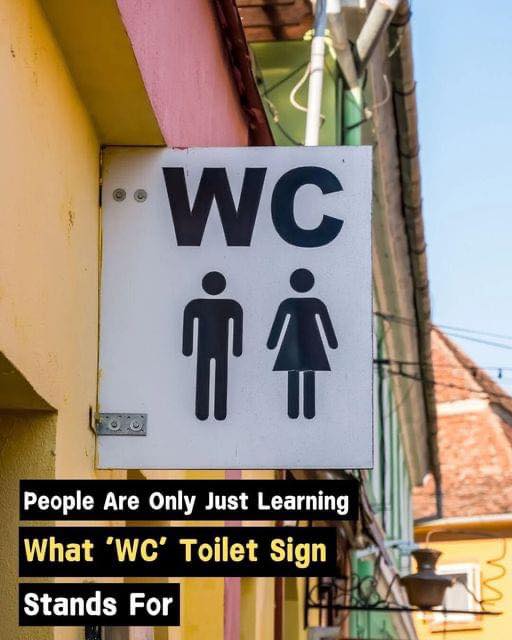Have you ever come across the initials WC on a sign outside a public lavatory and pondered about their meaning?
Countless individuals worldwide are also attempting to unravel the enigma of the WC, which is a space equipped with a commode and a washbasin. You are certainly not alone!
Even though we will provide you with an elucidation of the WC, we cannot guarantee that the term will be any clearer than restroom, bathroom, or loo…
In the year 2020, a pair named Shelby and Dylan shared a TikTok video showcasing a notable contrast in how certain Americans and Canadians conduct their business.
As he passes by a sign that reads “washroom,” Dylan questions, “What on earth is a washroom?”
“What are they cleaning in there? Oh, it’s just a bathroom. The only thing I ever cleanse in there is my hands,” he remarks to his spouse.
Off-screen, Shelby is heard inquiring, “Do you repose in a lavatory?”
@shelbanddyl I didn’t know he had Canadian roots 🤣 We got to ride a horse trolley and loved it! We can’t wait to come back and do a lot more! ❤️#shelbanddyl #husbandreacts #canada #couples #relationships ♬ original sound – Shelby & Dylan

Nowadays, one can frequently encounter signs displaying WC in establishments such as airports, eateries, and hotels. It is simply another denomination for “lavatory” or “bathroom,” but it is commonly utilized in a more formal manner, particularly in venues that cater to patrons from various regions of the world.
Chronicle of the WC
Prior to the 1800s in America, possessing an indoor lavatory was a luxury accessible only to the affluent. The majority of individuals had to use outhouses or other outdoor facilities when nature called. Even though many residences had “bathrooms” designated for bathing, they typically did not feature commodes. It wasn’t until the late 1800s when indoor plumbing became prevalent, especially with the advent of the water closet circa 1890. These washrooms had commodes segregated from the bathing areas.
It was not until the early 20th century that the contemporary bathroom, amalgamating both bathing amenities and toilets into a unified space, became customary.
Incorporating toilets and bathtubs in one room is a clever approach to save space and facilitate plumbing. Nevertheless, this configuration can compromise privacy, which poses an issue in shared lavatories.
The term “water closet” has evolved over time to signify a compact, secluded room within a larger restroom solely dedicated to the commode. These water closets typically feature a petite washbasin for handwashing, making them practical and all-encompassing.

Reddit users endeavored to decode the rationale behind labeling a public lavatory a “bathroom” when it lacks a bathtub. They shared their viewpoints in a post entitled, “Why is a public WC called a bathroom if there is [no] bath?”
Reacting to the post, a Redditor remarks, “Americans may similarly question: ‘Why is it termed a WC (water closet) if it isn’t even a closet?” the observation then clarifies that a “bathroom” or “lavatory” is the “preferred US substitute for ‘room with commode,’ whereas other regions utilize ‘WC,’ ‘lavatory,’ ‘loo,’ etc.”
In Russian, they assert it’s “a room without windows” even if a window is present, as elucidated by one individual. Another contributor interjects, noting that in Esperanto, it is termed necesejo, signifying “necessary place.”
Conversely, other Redditors deliberated on the merits of washroom versus bathroom and restroom.
An online user remarked, “In Canada, they commonly refer to it as a Washroom,” whereas another individual added, “I reside in the Midwest, and we frequently utilize washroom as well. Nonetheless, I believe bathroom or restroom are the most prevalent terminologies.”
“I believe washroom is the most suitable term. You should be cleansing in there,” affirms another. “…not relaxing.”
What are your musings on lavatories, and how do you typically address the chamber containing a commode? We are eager to hear your insights, so please share them with us and disseminate this information to others to elicit further responses!

Leave a Reply